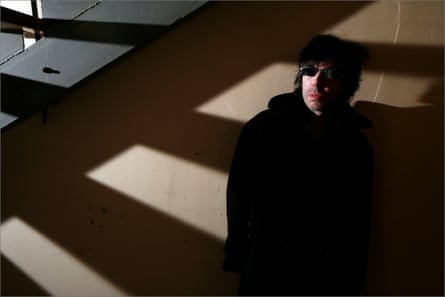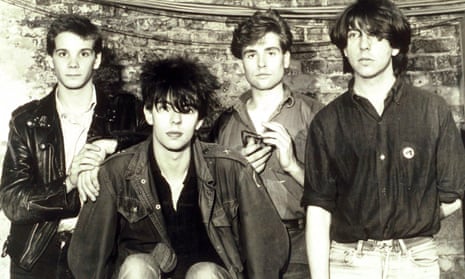1. The Pictures on My Wall (Zoo Records version)
Given that he once burned a million quid and dumped a dead sheep at the Brit awards, the KLF’s Bill Drummond isn’t a man who’s short on big statements. Still, the Bunnymen’s one-time manager was patently sincere when he described them as “the greatest rock band of all time”. The group certainly made some magical records, and they weren’t far short of greatness on this very first Zoo Records single. Improbably, singer Ian McCulloch had been in a band with two other Liverpool luminaries – Pete Wylie and Julian Cope – when he briefly rehearsed as the Crucial Three. Wylie went on to front Wah! Heat, and Cope was with the Teardrop Explodes, while McCulloch found the perfect vehicle for his big voice, large overcoat and not exactly diminished ego with the Bunnymen. He learned about how to be a rock star from listening to David Bowie’s The Rise and Fall of Ziggy Stardust and the Spiders from Mars. On The Pictures on My Wall, we hear McCulloch’s formative influences. The embryonic Bunnies are also a trio on this track, with McCulloch joined by Will Sergeant on guitar and Les Pattinson on bass. (“Echo” was the band’s drum machine). Post-punk and psychedelia blend wonderfully with an anthemic chorus and haunting vocal. The Pictures on My Wall would appear in a different form on the band’s 1980 debut, Crocodiles, but with only 4,000 copies pressed, the original seven-inch record still fetches tidy sums.
2. All That Jazz
The writing was on the wall when the band made their live debut at Eric’s Club in Liverpool in November 1978. Echo malfunctioned, wreaking havoc with the setlist, so it was quietly put back in its box and replaced by a human drummer. Not just any drummer, either, but a colossally talented 19-year-old named Pete de Freitas, whose arrival marks the proper beginning of the group. The newly bolstered and toughened-up rhythm section kickstarts this firecracker from Crocodiles, before McCulloch supplies one of his most foreboding vocals: “Where the hell have you been? / We’ve been waiting with our best suits on / Hair slicked back and all that jazz / Rolling down the Union Jack / See you at the barricades, babe / See you when the lights go low, Joe / Hear you when the wheels turn round / Some day when the sky turns black.” McCulloch’s words capture the feeling of those pre-Falklands/cold war times – that jingoism, crisis and war were on the way – while Sergeant’s guitar playing is the epitome of brutal economy and De Freitas’s snare drum rolls explode as if bombs are going off around him.
3. Zimbo (live version)
Crocodiles cemented the Bunnymen as music press darlings, their romantically doomy mentality a perfect choice for wistful teenage hipsters . Quickly, McCulloch found himself leading what he later called a “section of youth”. Like Ziggymania, an army of young fans enthusiastically copied McCulloch’s gravity-defying barnet and the various Bunny looks, which changed from overcoats to army camouflage. When Bunnymania arrived in Buxton, Derbyshire, for a secret gig, the locals were reportedly concerned by this sudden invasion of young (mostly) men in military apparel. In the ornate Pavilion, the Bunnymen themselves were swathed in dry ice and on top of their game as the new kings of left-field pop. The Buxton recordings of new songs Zimbo (later retitled All My Colours) and Over the Wall gave the band their first taste of the Top 40. Although Adam and the Ants had scored hits featuring a similarly African-inspired rhythm, the combination of de Freitas’s hypnotic pounding and McCulloch’s stark, powerful vocals still sounds unusual. At Womad in 1982, the band even performed it alongside percussive ensemble the Drummers of Burundi, leading Mac to quip: “Hello. We’re Echo and the Burundimen.”
4. Over the Wall
By now, the Bunnymen were contemporaries of New Order and the Cure: big, but still culty, making dark music with occasional shards of sunlight. Touring had toughened them up into an increasingly formidable, slightly psychedelic rock group, capable of seamlessly dropping snatches of classic songs (everything from the Doors to Frank Sinatra) into their own on stage. The once shy, chronically myopic McCulloch had evolved into an entertainingly opinionated frontman, earning him the nickname Mac the Mouth. These factors (plus the creative powers of magic mushrooms) all forged their second album, Heaven up Here. The album’s epic centerpiece appears in more subtle, textured form than the Buxton live version. An exercise in controlled power and smouldering aggression, McCulloch’s lyrics erupt in a fabulously ominous chorus: “Over the wall, hand in hand / over the wall, watch us fall.” The Bunnymen accompanied its release in May 1981 by hastily dropping the much-loved “camo” gear for “old men’s”-style raincoats and hats; many a wrongfooted fan faced a frantic dash to the nearest gentlemen’s outfitter.
5. A Promise
The gulf that existed between the cool-but-cult world of college circuit bands and the chart mainstream in 1981 was coldly illustrated by the flop of the Bunnymen’s next single. Because music press front covers didn’t have anything like the power of daytime airplay, A Promise limped to a lowly and faintly inexplicable No 49. Although Heaven Up Here itself made the Top 10, this single is one of their canon’s forgotten gems which rarely features in their live sets. Nevertheless, it’s a song that shows that the band could navigate delicate and graceful as well as powerfully haunting. McCulloch’s evocative, elemental phrase “Light on the water” inspired the sleeve imagery, shot on South Wales beach as a flock of seagulls hurriedly take flight from the sudden arrival of a bunch of mouthy Scousers.
6. The Back of Love
In 1982 and 1983, the Bunnymen were just about managing to juggle the conflicting demands of being a largely alternative/music paper group and a bona fide chart act. This status weighed heavier on their shoulders once The Back of Love breached the Top 20 in 1982. Unlike rivals U2 and Simple Minds, the Liverpudlians didn’t make a conscious effort to step up to stadiums or embrace the mainstream – as McCulloch has been keen to remind everybody since. Instead, the singer enjoyed taking pot shots at Bono and Jim Kerr in the press while his band entertained their fanbase with wilfully anti-commercial japes. They gigged in the Outer Hebrides and even cajoled the fanbase to cycle around Liverpool on a route mapped out in the shape of a rabbit’s ears.
Neverthless, their music was becoming gradually more commercial and here they bolster their trademark mystery and beauty with a faster tempo, cellos, woodwind and stringed instruments. The breathlessly paced Back of Love and Top 10 smash The Cutter showed that they could chart while keeping their cool credentials, and they celebrated with two nights at the Albert Hall under the slogan: “Lay down thy raincoat and groove.”
7. The Killing Moon
According to Mac the Mouth, this is the greatest song ever writtenand featured on1984’s Ocean Rain, a record advertised by the band’s record company as “the greatest ever made”. After the experimentalism of the previous Porcupine, Ocean Rain found McCulloch and co blending sublime balladry with ornate orchestrations, and both the album and this first single from it are probably their strongest.
In 2015, McCulloch told the Guardian that The Killing Moon’s lyrics about “birth, death, eternity and God – whatever that is – and the eternal battle between fate and the human will” had come to him in a dream, and he hastily adapted them to fit the chords of Bowie’s Space Oddity, played backwards. Guitarist Will Sergeant suggested that the song’s unusual use of balalaika had been inspired by a trip to Russia in which they had come across young communists in bri-nylon flares. The result: an unabashed 80s classic which took the band’s music to a global audience some years later when it was used in Donnie Darko.
8. Ocean Rain
In the finest tradition of a band who were capable of incredible grandeur and occasional high farce, McCulloch laid down the vocals for the greatest album ever made in Paris, decided they were rubbish and did the lot again in considerably more humble Kirby on the Wirral. Nevertheless, the mix of continental flair and Merseyside bite paid off, and some, not least with this epic, oceanic title track. “All at sea again / And now my hurricanes / Have brought down / This ocean rain / To bathe me again,” sings McCulloch, as if on a quest for some sort of holy redemption. Ocean Rain spawned more hits in the form of the rousing Silver and Seven Seas and the following year’s Bring on the Dancing Horses saw them hog the charts again, but soon their trajectory would change.
9. The Game
McCulloch refers to the band’s 1987 eponymous, fifth long-player as “the grey album”, a reference not only to the dull monochrome sleeve but also the deathly pallor of some of its content. With Drummond quitting, and the pace of their lifestyle finally taking its toll, the band succumbed to internal and external pressures: personal problems within the band (not least the singer’s heavy drinking); and record company demands for a more commercial, polished sound.
De Freitas took his sticks and left for a while, there were aborted sessions with (subsequent Pixies producer) Gil Norton and a salvage job with producer Laurie Latham. After a difficult gestation, the album received mixed reviews, although it peaked at No 4. For all McCulloch’s (mostly valid) criticisms, it does contain some real gems. Lips Like Sugar is the album’s smash, but The Game has an anthemic, slightly ill-fated atmosphere. Sergeant’s guitar playing is some of his very finest. The lyrics are effectively McCulloch’s proud riposte to the music business: “A sense of duty was my one intention / And an ugly beauty was my own invention / Pride a proud refusal / And I refuse to need your approval / Too many seekers, too few beacons / But through the fog, we’ll keep on beaming”. Having “already played the game”, the band were on the verge of splitting up. After a final gig in Fukuoka, Japan in 1988, McCulloch’s father died while the singer was on the flight home. A year later, De Freitas was killed in a motorcycle accident; he was 27.

10. Nothing Lasts Forever
You can’t keep a great band down, or even a mediocre one these days. However, back in 1997, few bands returned after splits – and even less with such style as the Bunnies, in what was dubbed “the greatest comeback ever”. This magnificent single explains why. Apparently McCulloch felt that releasing the strings-drenched Nothing Lasts Forever as the comeback single was a risk, because it was a ballad, but the gamble paid off as they reached No 8 with a song that soars to the heights of The Killing Moon.
McCulloch had had the song in various forms since 1990, but – with Liam Gallagher on uncredited, Beatles-esque backing vocals – it chimed perfectly with the post-Britpop era and the sense of another musical and social sea change. With McCulloch channelling his favourite crooners into this sublime tale of thwarted ambition, redemption and transiency, Nothing Lasts Forever could be the Bunnymen’s signature anthem. Still, although Les Pattinson left, and commercial heights have eluded them since, the two remaining originals are very much still here.

Comments (…)
Sign in or create your Guardian account to join the discussion